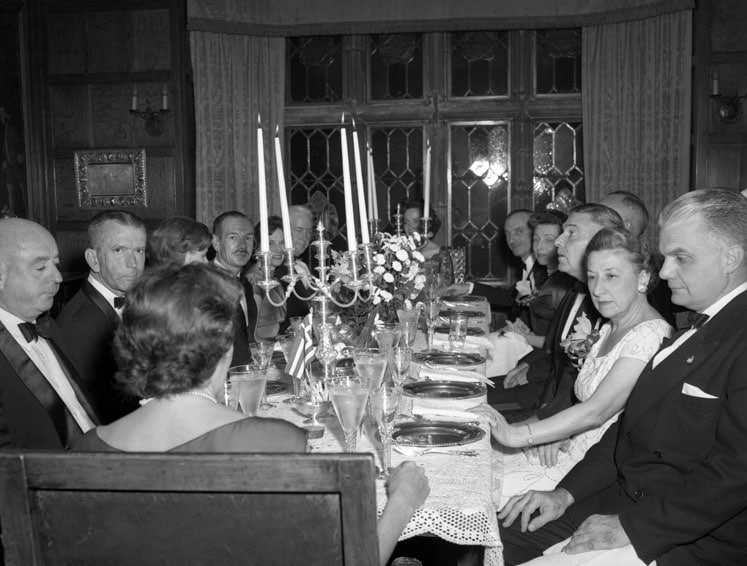Major Donor Fundraising
How To Organise Major Donor Events to Attract & Retain High Value Supporters
Attracting major donors to your cause is a crucial part of fundraising. It’s also the challenge that keeps many fundraising directors up at night.
With government grants slashed and big gifts on the decline, charities and nonprofits are increasingly dependent on major donors. It’s not all about cash donations either. These donors can also offer their influence and time that can often prove invaluable in furthering your cause.
The question now is how do you recruit high value supporters to your cause and keep them engaged?
We believe that an expertly planned and executed event is one way. This guide takes you through how you can use events to attract and retain major donors. It addresses the following two areas:
- Attracting Major Donors
- Retaining Major Donors
Major Donor Events
One way you can attract donations and keep major donors engaged is through events. These events have to be perfectly pitched with the right proposition or else you risk alienating your wealthy supporters.
In a time of austerity throwing lavish dinner parties and glamorous fundraising balls is not recommended. A new and more considered approach is needed.
It’s all too easy to spend resources on organising a fundraising event that fails to meet the needs of major donors. You want to make sure that you’re not wasting your own time and efforts as a fundraiser. Our aim is to help you achieve success.
We have split this guide into two sections – one that looks at recruiting new major donors with events and the other at retaining them.
Recruiting New Major Donors
Many fundraisers are concerned about how they can continue to attract new donors to their cause. After all, many charitable organisations are desperately in need of the same funding. It therefore takes a more nuanced and tactical approach that we explore in this section.
Researching Donors
You should invest as much time and resources as you can in researching potential major donors and segmenting them intelligently. The segmentation process will also help you to identify existing donors that could become higher value supporters.
By having accurate information in a database on potential donors, you are then able to tailor your approach to meet their unique needs. You can find out what motivates them and create an event that taps into this effectively. For example, some donors are primarily interested in local causes whereas others want to make a difference on a world stage, funding humanitarian causes overseas.
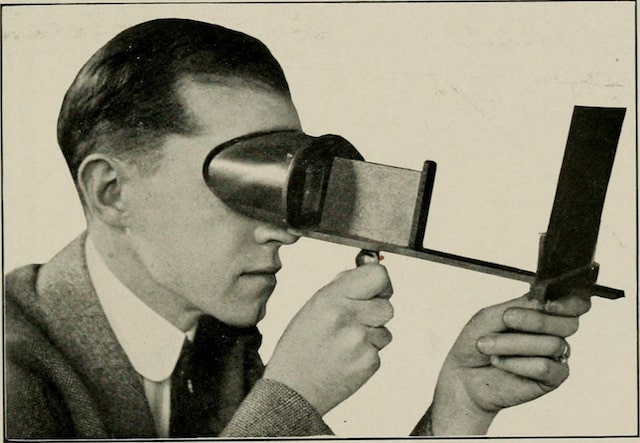
Examine your existing donor data – image via Internet Archive Book Imagery on Flickr
You should also qualify potential larger donors to make sure that they are suitable candidates. There are a few basic criteria they will need to meet. They need to have money – in the majority of cases a major donor will have funds put aside to donate to causes they believe in. They also need to have a connection to your cause; this may be through a personal experience, their location or around their working life. You can investigate to see if they have a history of supporting causes similar to yours. The final piece of the puzzle is a passion for your cause. Donors donate because it brings something to their life, enriches it in some way.
You will want to consider the following:
- What are their networks? Connections?
- Have they donated before? How much have they given?
- What other charities do they support?
- What are their motivations?
- Do they have a personal connection with your cause?
- Who in your organisation has had contact with them?
Know the Law
By analysing your existing data, you can be more intelligent and focussed in your major donor fundraising. However, how you handle personal information is subject to strict legal guidelines. In 2018, a new legal framework will come into place entitled General Data Protection Regulation .
What do major donors want?
Every major donor is different. They have different motivations for supporting the causes that they do. Having said that, there are some things that they are likely to have in common.
What major donors like:
A personal touch
Higher value donors really appreciate a personal touch. They want to form relationships with key members of your organisation. Major donors therefore enjoy having contact with front-line staff members, trustees and board members over fundraisers. Smaller events are much more suited to this more personal approach.
Access & Influence
Major donors want to be able to chat to board members and trustees so they can exert influence and feel like they are shaping the fundraising program. Some donors want to be actively involved in your organisation.
They want to be listened to and be seen to have some influence on your mission and strategy. It is important to give them a space to offer their opinions and follow-up without granting them a disruptive level of influence. Major donor events can be a great way to give them exclusive access to your future campaigns and the opportunity to provide feedback. By sharing clear fundraising strategies for the coming years, you help retain high value supporters. Make sure everyone attending the event from your organisation is aware of the future vision for your charity.
Trust & Transparency
Major donors like you to be open about where their money goes, the projects it funds and the results it brings. Your transparency will hopefully be rewarded with more trust and buy-in. It’s important to be honest too, especially when it comes to the importance of their donations.
You have to make a decision as to how much access you are willing to give as some high value donors will want to see accounts and get details about your organisation’s governance.
Regular updates
It’s important to keep your donors regularly updated with how their money and time are being used. This does not have to be lengthy reports or documents, but regular personal updates by phone or email. Events can also be a great way to communicate the value of any ongoing projects in language that connects with your wealthy supporters.
There is an insightful article on the Guardian as to what donors like and don’t like about events, based on real world testimonies.
Dr Beth Breeze in her paper What do we know about major donors at the start of the 21st century? offers further insight into what motivates major donors. She also provides a typology of UK philanthropists that could help with your segmentation.
New Philanthropists
In her paper, Dr Breeze makes reference to a unique type of high value giver identified in the mid-noughties by Charles Handy in his 2006 work The New Philanthropists. Younger and often self-made following a successful career, these major donors require a slightly different approach. Handy summarises their situation:
“Having made enough for their own needs they now want to use their money, their skills and their abilities to get things done to create something transparently useful in society. They talk of making a difference, of giving something back, but they aren’t satisfied by writing cheques to worthy causes, valuable though such charity can be. These people want to be in the driving seat because that’s where they belong.”
They are keen to use their skills to help drive your charity forward and are therefore more likely to want to invest time and effort as well as money. This requires you to take a more collaborative approach so be prepared to talk about working together and giving them a higher level of access. With this increased engagement, they also tend to want more measurable outcomes. Bear this in mind when talking to them at events.
This new type of more engaged philanthropist are driven by a greater sense of meaning, so their support of your cause is personal. You should therefore use the event to highlight what their donations have been able to do on a large scale, stressing that you couldn’t have done it without them. As with other major donors they want to know that they’ve made a difference and to feel special. You can also mention how their donations helped motivate and energise fundraisers.
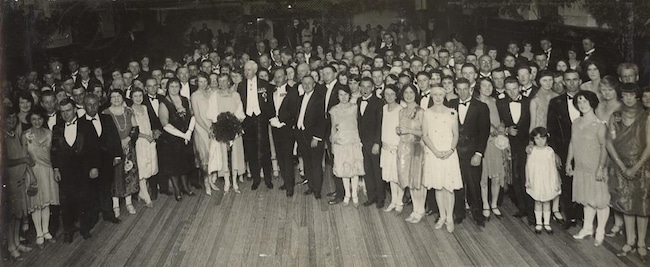
Image of charity ball in 1927 via State Library of Queensland on Flickr
What major donors don’t like:
Things to avoid
You don’t want your event to be a direct fundraiser where you apply pressure to donors to donate more often or in larger amounts. Sell the dream and what your ideas can achieve and let them make the decision. Avoid employing forceful or deceptive techniques to raise additional funds.
You need their support so you don’t want to seem that you have too many donors. At the event, you should consider this, especially when deciding on how many guests to invite.
So, what do donors want from an event?
In summary, high value supporters want major donor events to provide the following:
- A clear and transparent strategy communicated in an engaging way
- A space for them to provide feedback on your strategies and projects
- An opportunity to meet board, trustee and frontline staff rather than a team of fundraisers.
How to retain major donors with events
As important as it is to attract new high value donors, it is essential that you retain your long-term major donors. To help do this, you should put some planning time aside to look at how to effectively engage your existing donors at the event.
Board members and trustees should be fully equipped with talking points so that they can give existing major donors special treatment. Again, it all comes down to recording data, keeping it accurate and up to data, analysing it and then using it.
It’s good practice to communicate regularly with all of your donors, updating them on how their donations have impacted your cause and will continue to do so in the future. Again, the personal touch goes a long way for higher value donors. A phone call from someone high up in your organisation can be particularly effective for major donors.
Events are also extremely effective at communicating how their money is making a difference and go some way to ensuring their continued loyalty. A sense of urgency can also be communicated at the event without direct pressure on making donations.
Organising your Major Donor Event
Set a clear purpose for the event
You need to have a clear purpose for your event to make it a success. By having clear objectives, you are then able to get your team fully focused on achieving them.
Ultimately, you want your event to deliver a compelling case for the continued support of your major donors. You want to be able to show your appreciation and ideally increase donations. There is more to it than that though.
You can use the event to achieve a combination of the following:
- Spark interest in future campaigns
- Increase personal investment in your cause
- Grow donations & secure major gifts
- Re-engage existing donors
- Turn new donors into fully engaged supporters
- Highlight your organisation’s mission & how it can be achieved in a creative way
- Provide updates on existing campaigns
- Share the impact of donations
- Deliver emotional gratification for donors
- Develop a stronger and more personal connection with your larger donors
Planning
Set a date – find a date that works for your organisation and your major donors. Avoid popular holiday times and triple check that there are no clashes with other events.
Book special guests – make sure that the key people in your organisation as well as trustees and ambassadors of your cause are available.
Create a project timeline – create and share a timeline that charts all the steps that need to happen between now and the event. You should include milestones and deadlines.
Assign roles – have clearly defined roles for all of those involved in the event – this should include an event manager whose responsibility is to make sure the event goes smoothly and deal with any problems that might occur. You will also want someone on hand on the day to provide technical support and operate A/V equipment.
Invite attendees – review your data, compile a list of donors and then invite them – it is recommended that you invite more than your event capacity as turn out is often around 30%.
Invitations for Major Donor events
When it comes to invitations for your event, there are a few key considerations beyond the usual details of venue, travel information and any dress code. You want your invitation to tie in with the overall theme of the event. Be sure to mention anything special like entertainment or a unique dress code.
It’s also a good idea to allow major donors to bring other potential donors along . You should make this clear on the invitation but ask them to give you prior warning so you can do your research and ensure you can accommodate them space.
Who should attend from your organisation?
You want your leadership team, trustees, board members and frontline staff to be in attendance at the event as well as key volunteers.
Board members and trustees should be busy throughout the event as they are vital to its overall success. They should be in a position to greet new arrivals and welcome them to the event as well as enable networking by introducing guests to each other. Their objective is always to provide the personal touch and give the donors the attention they need. You should make your board members are easily identifiable by a name tag.
Chelsea Alves in her Ways to Host the Ultimate Donor Appreciation Event even suggests encouraging “your staff to help with serving so they are in a position to strike up personal conversations with guests.
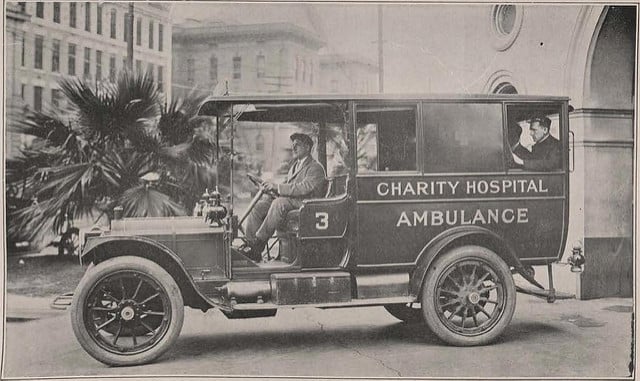
Ambulance from Charity Hospital Report 1912 via Internet Archive Book Imagery on Flickr
What size should my major donor event be?
Small events
Knowing how important the personal touch is to major donors, smaller events make sense. With smaller scale events you will be able to grant high value donors access to key members of your organisation, giving them what they want. The more intimate setting will also help unite your supporters behind your cause and give them a chance to network.
Large events
Larger events are great for raising more general awareness of your cause as well as for direct fundraising drives. For higher value supporters, you will usually want to opt for a smaller event.
If you do wish to invite major donors to these larger scale events, arrange for invitation-only pre or post event gatherings as Andrew Olsen suggests in his 13 Ways to Engage Major Donors. People high up in your organisation should attend these exclusive get-togethers. It’s a great way to make the donors feel special as well as appreciated.
Budgeting for your Major Donor event
As with any event, budgeting is vitally important. Although your donors are likely to be accustomed to the finer things in life, you can find a happy medium between quality and cost.
These are some of the costs you will need to budget for:
- Venue
- Food & Drink
- Entertainment
- Equipment hire
- Photography – many donors like to be visible, so it’s a good idea to capture the event with a professional photographer
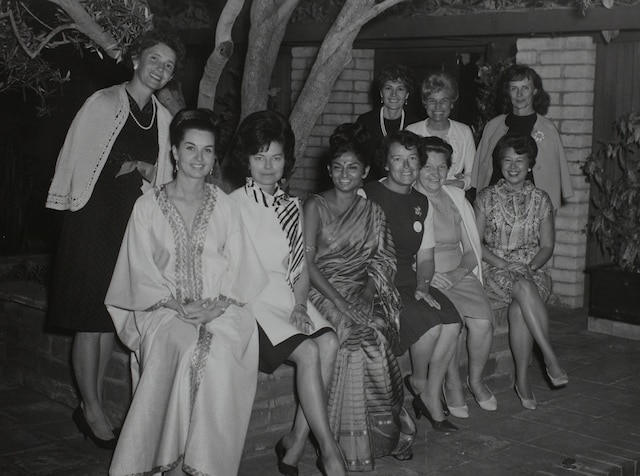
Reunion party via SDASM Archives on Flickr
Major Donor Event inspiration
It is always a good idea to research other fundraising and major donor events. What has worked well for others? What hasn’t? You are likely to find that the most successful events have strong themes that tie in cleverly with the event.
One of the best places to look is at the Third Sector awards for Fundraising Events. This will give you an idea of the calibre of events out there and provide inspiration. This winner from 2016 shows the potential of fundraising events.
Key Elements of a Major Donor Event
The event itself has to be of the highest quality in order to meet your goals. It is after all an extension of your organisation, reflecting your values and personality. Attention to detail is essential if you are going to build on existing relationships and further champion your cause. The following sections include advice on the key elements of a major donor event:
Talks, Speeches & Presentations
You need the presentations or speeches on the night to be compelling. It’s all about finding a narrative that brings your cause to life, telling a story that donors will connect with and remember. Each speech and presentation should tie into this wider narrative in some way. Remember to keep them short and punchy though.
In order to get the buy-in of donors, you should use as many real-life images and videos as possible. This can focus on the causes you are supporting as well as the work of volunteers within your organisation. Technology is also available to enhance your presentations, making them more dynamic and engaging – you can read our guide to event technology for inspiration.
Feedback
Whether you do this informally or by organising specific sessions, feedback is another important element to any major donor event. As we’ve discussed, it’s something valued by high value donors who want the opportunity to share their opinions and insights.
You can ask for feedback on a current campaign, a fundraising strategy or even a future program. After all, it is their donations that will be funding much of your activity. You need to demonstrate that you are listening and taking on board their suggestions.
It’s also worth pointing out that their advice and time can also be invaluable to your cause. Getting buy-in early to a new campaign can help ensure their continued support and even move them from a major donor to an ambassador, giving more of their time.
Atmosphere
You should aim to achieve a relaxed atmosphere for your guests at the event. Within a relaxed environment, conversations are easier and networking more natural. It’s worth reiterating that you want to avoid any hard sell or aggressive requests for donations. You want to focus instead on creating a greater emotional and personal connection between the major donors and your cause.
Entertainment
With major donor events, we recommend keeping the entertainment high quality and low key. You only want to go ahead with entertainment if it exceptional and well-suited to the event’s theme.
After the Major Donor Event
Following up
Within a week send out personal thank yous to everyone who attended the event. A photograph of them at the event is a nice touch, but you need to make sure it’s actually them in the picture.
You should also send those that didn’t attend an update of what was discussed including any presentations, videos and campaign updates. Just because they didn’t attend this time doesn’t mean that they aren’t a good candidate for future events.
20 Bedford Way
If you are looking to organise a fundraising event or major donor event in London then 20 Bedford Way is an ideal venue. Located in Bloomsbury, our central location means we benefit from incredible national and international transport links. Our suite of venues are affordable, allowing you to maximise the returns on your evening. The in-house catering is creative and adaptable, and we provide an a/v technician to execute this side of the event. To visit our venue or book call 020 7612 6143.
Header image via The Library of Virginia on Flickr.

